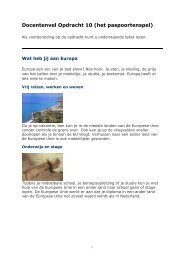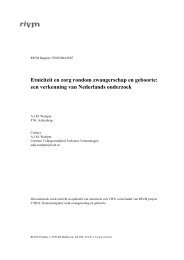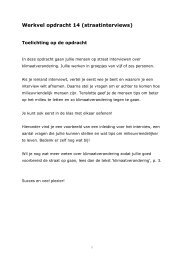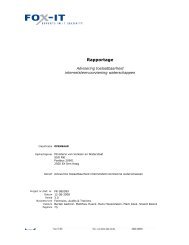Evaluatie Landelijk Kader Forensische ... - Europa morgen
Evaluatie Landelijk Kader Forensische ... - Europa morgen
Evaluatie Landelijk Kader Forensische ... - Europa morgen
You also want an ePaper? Increase the reach of your titles
YUMPU automatically turns print PDFs into web optimized ePapers that Google loves.
Summary<br />
Introduction<br />
The period 2003-2005 saw the phased implementation of the National<br />
Framework Forensic Diagnostics for Juveniles (in Dutch: <strong>Landelijk</strong> <strong>Kader</strong><br />
<strong>Forensische</strong> Diagnostiek Jeugd). The National Framework was set up following<br />
complaints in the field about the quality of forensic diagnostics for<br />
juveniles. The implementation aimed to improve the effectiveness of forensic<br />
diagnostics, to speed up forensic diagnostics and to improve quality of the<br />
diagnostic reports. In order to achieve these objectives, the tasks and responsibilities<br />
of the chain partners have been explicitly laid down in the National<br />
Framework. Formats and guides that support the allocated tasks have<br />
also been developed.<br />
The National Framework makes a clear distinction between forensic diagnostics<br />
in the criminal and civil domains. In the criminal domain, the National<br />
Framework is obligatory for all chain partners. In the civil domain, the National<br />
Framework is obligatory for the Child Care and Protection Board (in<br />
Dutch: Raad voor de Kinderbescherming), the judiciary and the Netherlands<br />
Institute for Forensic Psychiatry and Psychology (in Dutch: het Nederlands<br />
Instituut voor <strong>Forensische</strong> Psychiatrie en Psychologie). In terms of family<br />
supervision, the Youth Care Agency (in Dutch: Bureau Jeugdzorg) voluntarily<br />
participates in the National Framework.<br />
The Research and Documentation Centre (in Dutch: het Wetenschappelijk<br />
Onderzoek- en Documentatiecentrum) of the Ministry of Justice instructed<br />
the DSP group to evaluate the National Framework. The objective was to<br />
find out how minors are forensically diagnosed following the implementation<br />
of the National Framework, and to what extent the bottlenecks that were the<br />
reason for its implementation have now been removed. This answers the<br />
central question of the study:<br />
To what extent and how do parties apply the new method of the National<br />
Framework Forensic Diagnostics for Juveniles, what are the bottlenecks<br />
and how does this relate to the problems that were identified in the past<br />
When reading this summary, one must take into account the fact that the<br />
evaluation only allowed for a study of the formal quality aspects of reports<br />
and forensic diagnostics. This means that, it has for instance been established<br />
whether the way in which diagnoses are made has been imitably described<br />
and whether reports show whether the recommendation was tested<br />
for feasibility, but that it has not been established whether the diagnosis or<br />
the recommendation itself is substantively correct.<br />
Systematic accountability<br />
The evaluation is a follow-up to previous baseline studies that describe the<br />
situation in forensic diagnostics before implementation of the National<br />
Framework. Whenever the study makes a comparison with the old situation,<br />
the results of these previous studies were used.<br />
Pagina 5 <strong>Evaluatie</strong> <strong>Landelijk</strong> <strong>Kader</strong> <strong>Forensische</strong> Diagnostiek Jeugd DSP - groep









